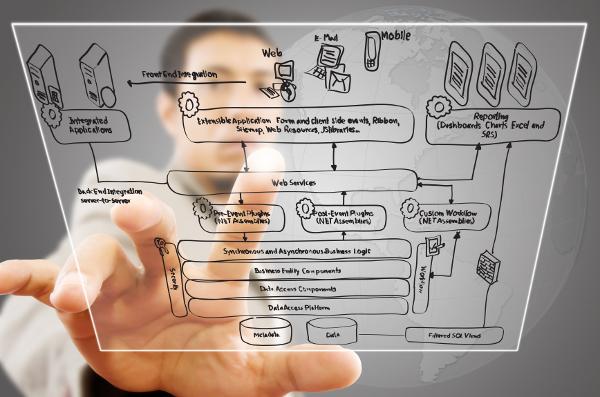
110488
New technologies like machine learning, cloud computing and IoT are changing how businesses serve clients and customers.
Deploying these technologies in an IT service management (ITSM) environment can help businesses offer better customer and client service, while eliminating errors and monitoring service processes in the business. It’s becoming an increasingly important methodology in the enterprise as companies rely more on chatbots, automation and the cloud to manage IT services.
If you’re looking to become an ITSM professional, or your organisation is looking to hire for ITSM roles, here are the 10 skills needed to succeed.
Automation
Automation is a growing trend in customer service — most often in the form of chatbots and automated processes. But it’s still in its early stages — skilled ITSM professionals will need to have an eye on how automation will grow in the business.
“Integrating network solutions will allow ITSM processes to trigger additional subprocesses that automatically resolve issues or fulfill requests before they are detected or seen by a human. However, triggering an action on the network, such as a configuration change or fix, is a decision that can result in a catastrophic network event. For this reason, a human will be required in the foreseeable future to approve or deny such an action,” says Marcel Shaw, ITSM expert and federal systems engineer at Ivanti.
While automation will help increase efficiency and free workers from mundane or repetitive tasks, it won’t be able to do everything a human can do — it’s not a “set it and forget it” mentality. ITSM pros will have to oversee automation in the coming years and know when it’s time to step in.
Artificial intelligence and analytics
Artificial intelligence is already gaining traction in the enterprise to help automate processes and to deliver detailed analytics. Kevin J. Smith, senior vice president of Ivanti, says that AI will completely change the landscape of ITSM in the next decade and organisations will rely on ITSM frameworks to manage the new technology.
“Intelligent technologies like chatbots, intelligent assistants and conversational automation will begin to offload the service desk and provide self-service that is increasingly faster, smarter and more engaging. The bottom line is that as AI begins to deliver a great ‘experience’ to users the demand will grow quickly and as such the ITSM organisation will apply more and more focus and resource to this area,” says Smith.
Business management
ITSM professionals need a balance of technical skills and business acumen to understand how business goals align with IT. The ITSM framework helps organisations blend the line between IT and the business side, so you’ll want to know how the business works to run an effective ITSM strategy.
“The ITSM organisation is being pulled into being run more like a business and to bring all of IT together and to then help to align IT and the business. Strong business skills are required for all of these initiatives and ITSM will emerge as the new leader of IT and then as a key business owner across the business,” says Smith.
Read more: What is a product manager? A complex, cross-functional role in IT
Change management
With the speed of change accelerating in today’s enterprises, change management is becoming a necessary skill for ITSM success. Digital transformation sees businesses undergoing major changes to processes and IT infrastructure, making it vital for IT pros to stay on top of business objectives, workflows and IT activity.
“Change management is another core concept in ITSM, so being able to communicate the ‘why’ of new or updated processes and being able to encourage adoption and compliance buy showing the ‘WIIFM’ [what’s in it for me] is key,” says John Peluso, Public Sector CTO at AvePoint.
Communication
ITSM pros need to know how to communicate highly technical information to customers, clients and business users who may not understand IT terminology.
“The ability to translate bits and bytes and technical information into meaningful communication at a level that the customer can understand is very important,” says Shaw.
The ITSM framework offers standardized definitions for technology, software and IT concepts that are common in the business, but there’s no guarantee everyone you interact with will have the same ITSM knowledge as you. Therefore, you will need to know how to effectively deliver information to people in a way that best suits their understanding.
Continued learning and agility
ITSM programs are continually improved and adjusted as technologies change or as business goals shift. Because of this, ITSM pros must dedicate themselves to ongoing learning.
“A core component in many ITSM programs is continuous improvement. This, of course, requires practitioners to be agile in their thinking and processes. As an example, just think of all the disruption to service management that has been caused by cloud applications in the last few years. Not only does the practitioner need to be agile — he or she also needs to be able to effectively communicate these new processes to his or her peers, subordinates and user community,” says Peluso.
To stay relevant in IT you need to be on top of the latest trends and have an idea of how to adjust and prepare the business for disruptions or new technologies. You’ll want to continue your education through ITSM certifications and training courses, so you can help your organisation with its digital transformation strategy.
Customer service
ITSM is all about service — so an ITSM pro needs experience dealing with customers and clients. You’ll need to have a strong understanding of what customers want, how to respond to complaints and a knowledge of customer service portals and other software.
“Obviously, there are some very powerful technologies out there that support ITSM in organisations, and the better a practitioner understands the technology and its capabilities, the better they can fulfill many roles in ITSM initiatives. However, across all roles, it’s important that we remember that the ‘S’ in ITSM is for ‘service.’ At the end of the day, ITSM is about understanding the needs, inclinations and productivity of the user community — so soft skills like empathy and effective communication skills are also essential,” says Peluso.
You need to be able to empathise with customers and clients to balance their needs with the overall business goals. Understanding how to interact with customers is a cornerstone skill for any ITSM professional.
Interpersonal skills
As an ITSM pro, you won’t just be dealing with customers and clients, you’ll also be responsible for communicating internally with stakeholders, executives and other business units in the organisation. You need to know how to work with others, especially those who might not understand the technology at play in a service environment.
“ITSM analysts that earn the trust of stakeholders will be most successful. Earning trust requires an analyst to be transparent, accountable, and motivated. Analysts who deliver before deadlines, and that deliver on what they promise will be trusted over those who don’t. Good relationships with non-IT stakeholders will be critical for ITSM analysts that want to be successful,” says Shaw.
You want the IT department to be accessible to the entire organisation, so that means you’ll have to spend time getting to know and interacting with other business leaders in the company. That way, when an IT service project pops up that requires buy-in from other departments, you’ll already have an established relationship to work from.
Innovation
An ITSM professional needs to be innovative to understand how past, present and future technology will work together in the enterprise. Not only do you have to stay on top of the current technology, but you might be asked to integrate legacy systems or to prepare the organisation for a new disruptive technology.
“The fact is that the continued evolution of technology and the remarkable changes in the global landscape of business will demand that ITSM pros bring more creative problem solving and innovation to the business because the business needs this more than ever. It will simply not be possible to compete in virtually any facet of business over the next 10 years without a commitment to innovation. Customers expect this, and the new market leaders will understand the value of innovation and bring this focus to IT and to the business every day,” says Smith.
Problem-solving
As an ITSM professional you can’t hide away in the IT department, you need to help make IT accessible to the rest of the organisation. Historically, the IT department hasn’t been at the forefront of the business, but it’s now become the core of most organisations.
“The ITSM team is increasingly recognised as the ‘Hub’ of the IT organisation and as such will be called on to manage larger and more strategic initiatives across IT — becoming the leader of IT in many regards. Taking on this leadership requires communications and problem-solving skills because the traditional technical skills are not enough,” says Smith.
You’ll be called on to help address large-scale technological issues within the company, so you’ll need to have strong problem-solving skills to help lead the organisation in the right direction. This is especially important in a service-context, since you’ll need to address customer and client issues as quickly as possible.
Join the CIO New Zealand group on LinkedIn. The group is open to CIOs, IT Directors, COOs, CTOs and senior IT managers.
